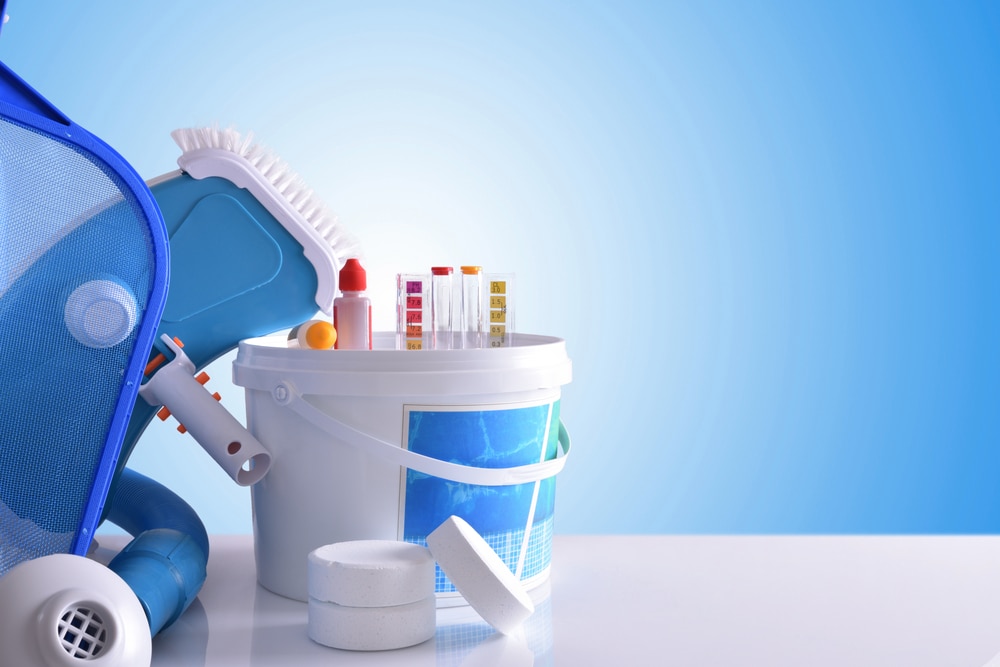| Disclaimer: We strive to provide objective, independent advice and reviews. When you decide to use a product or service we link to, we may earn a commission. |
Maintaining a pool can be a bit intimidating for first-time pool owners. If you’re selling a property with a pool, it can be a good idea to write down your weekly maintenance routine to pass along to your buyers.
If you’ve just purchased a home with a pool and you’re looking for guidance, we have some pool maintenance advice for beginners.
Take Care of Your Pool Year-Round
Your pool may not be used much during the winter, even if you live in a warmer climate, because the water temp will simply be too cold if you don’t have a heater. Even if you’re not using it much, you still need to perform daily maintenance to make sure you keep your water stable.
Doing so will help you avoid cloudy water and algae growth and will make it much easier to enjoy your pool when the weather warms up.
Clean and Test Water Daily
The most important aspect of maintaining a pool is ensuring the chemicals in the water are properly balanced. This can be done a number of ways, but perhaps the most common is to use testing strips that you dip into the water. The color-coded results will display information on the water’s pH balance, chlorine levels, and so on.
You can buy these strips and other test kits online or at any home improvement, big box or pool supply store. Pool water should be tested daily to make sure the water is safe for swimming.
It’s also recommended that you do a simple clean every day and a deep clean once a week. For your daily clean, use a skimmer net to remove any debris, such as leaves or grass. If you have a pump, it will save you time if you install a vacuum that runs for a few hours each day to remove loose dirt and dust from the bottom of the pool.
Once a week, you should use a hand held brush to scrub any debris off the side walls of your pool.
Learn When to Add Chemicals
When you test your water, the results will tell you if your pool has too much, too little or just enough of each of the items it measured. If you see that your PH is high or your chlorine is low, you’ll have to add chemicals to re-balance your water. Each chemical plays a different role in making your pool safe and clean. For example, chlorine disinfects your water and sodium bicarbonate helps you increase your PH if it’s too low.
Typically, it’s best to add any necessary chemicals to the water early in the day or late at night. If you add chemicals in the middle of the day when the sun is high, it’s possible that the chemicals will evaporate before they have a chance to properly dissolve into the water. It’s also best practice to always wait at least an hour you add chemicals to swim.
Don’t Overspend on Chemicals
Take the time to become better educated on the chemicals your pool water requires to stay clean and balanced. This includes chlorine, shock treatment, hydrochloric acid and a number of other basics, which vary based on the type of pool you own.
Once you understand what chemicals you need and you know what function each of them serves in keeping your water balanced, you can explore money-saving alternatives.
For example, ascorbic acid – which is a treatment commonly used to treat metal stains – is just a fancy word for vitamin C. You can find cheaper alternatives on Amazon or at your local nutrition shop. Also, chlorine tablets are significantly cheaper than liquid chlorine.
Buying your main chemicals in bulk can also save you a good amount of cash.
Clean and Maintain Equipment
Replacing malfunctioning pool equipment can easily cost hundreds or even thousands of dollars, which is why caring for your existing pool equipment is so important. For example, be sure to clean out your pool filter regularly to prevent the buildup of debris. Furthermore, you should be emptying your pool’s skimmer basket on a regular basis to prevent debris clogs that can burn out your pool pump.
Also, keep in mind that you don’t need to run your pool pump 24 hours a day. In fact, depending on your location, 8 hours a day or less should do the trick. But, the number of hours you need to run your pump per day varies based on the size of your pool, horsepower and type of filter you own, temperature, and so on. If you need advice on how long to run your pump each day to maximize cleanliness and minimize cost, contact your local pool store and tell them what kind of pool and equipment you’re working with.
Visit a Pool Supply Store for Specific Guidance
Most pool supply stores will test your water for you and will advise you on the best way to treat and maintain healthy water. If you’re just getting started, it can be a great idea to take in a sample to have it tested, so you can get a professional opinion on what you need to do. They can offer advice on what types of chemicals will make your maintenance easy.
If you prefer to outsource pool care, you can hire a maintenance service to come to your house on a weekly basis.
